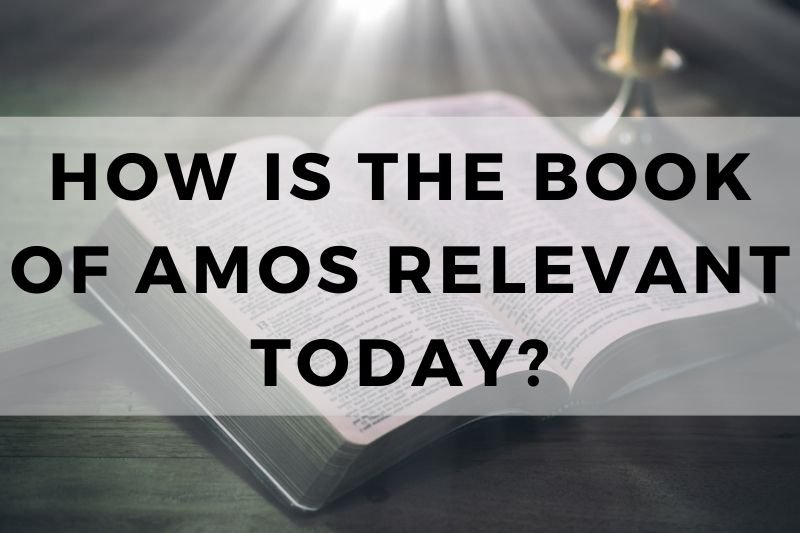
The Book of Amos, a section of the Hebrew Bible, offers timeless wisdom applicable to modern times. Its straightforward messages resonate across generations, addressing societal issues with clarity and conviction.
In today’s world, where justice, ethics, and morality remain paramount concerns, the insights from Amos hold significant relevance. This article delves into the enduring relevance of the Book of Amos, exploring its teachings on social justice, environmental stewardship, ethical leadership, religious hypocrisy, global injustice, and the call for repentance and change.
A Brief Introduction to the Book of Amos
The Book of Amos, one of the twelve Minor Prophets in the Hebrew Bible, provides a snapshot of the eighth-century BCE prophetic tradition. Amos, a shepherd from Tekoa, delivered his prophecies during a period of economic prosperity and moral decline in ancient Israel. His messages, recorded in nine chapters, convey a stern warning against injustice, oppression, and religious hypocrisy.
Amos’s prophetic ministry primarily targeted the Northern Kingdom of Israel, condemning the affluent elites for their exploitation of the poor and marginalized. He vehemently denounced the prevailing social injustices, emphasizing the importance of ethical conduct and adherence to divine commandments.
Despite its brevity, the Book of Amos showcases powerful imagery and rhetorical skill, highlighting the prophet’s impassioned plea for repentance and social reform. Through vivid visions and direct confrontations, Amos challenges his audience to reflect on their actions and return to a path of righteousness.
This concise yet impactful book serves as a poignant reminder of the enduring struggle for justice and righteousness in human society, making it a valuable resource for moral reflection and ethical guidance in contemporary contexts.
How Is the Book of Amos Relevant Today
#1. Social Justice
The Book of Amos underscores the importance of social justice in contemporary society. Amos vehemently condemns the exploitation of the poor and marginalized by the wealthy elites, proclaiming, “But let justice roll on like a river, righteousness like a never-failing stream!” (Amos 5:24, NIV). This call for justice resonates today, urging individuals and communities to address systemic inequalities and advocate for the rights of the oppressed.
#2. Environmental Stewardship
Amos’s message extends beyond human affairs to encompass environmental stewardship. He warns against environmental degradation, declaring, “The fields are ruined, the ground is dried up; the grain is destroyed, the new wine is dried up, the olive oil fails” (Amos 1:10, NIV). This admonition prompts reflection on humanity’s responsibility to care for the Earth and its resources, urging sustainable practices and conservation efforts.
#3. Ethical Leadership
Amos challenges leaders to uphold ethical standards and govern with integrity. He denounces corrupt rulers, proclaiming, “You trample on the poor and force him to give you grain… You oppress the righteous and take bribes and you deprive the poor of justice in the courts” (Amos 5:11-12, NIV). This rebuke serves as a timeless reminder of the need for ethical leadership grounded in justice and compassion.
#4. Religious Hypocrisy
The Book of Amos confronts religious hypocrisy and superficial piety. Amos admonishes those who engage in ritualistic practices without genuine devotion, stating, “I hate, I despise your religious festivals; your assemblies are a stench to me” (Amos 5:21, NIV). This critique prompts reflection on the sincerity of religious observance and calls for authentic faith expressed through righteous living.
#5. Global Injustice
Amos’s prophetic message transcends national boundaries to address global injustice. He denounces oppression and violence perpetrated by nations against others, declaring, “For three sins of Damascus, even for four, I will not relent… Because they threshed Gilead with sledges having iron teeth” (Amos 1:3, NIV). This indictment serves as a stark reminder of the interconnectedness of human suffering and the imperative of working towards peace and justice on a global scale.
#6. Call for Repentance and Change
Ultimately, the Book of Amos issues a call for repentance and transformation. Amos urges his audience to turn away from wrongdoing and embrace righteousness, proclaiming, “Seek good, not evil, that you may live. Then the Lord God Almighty will be with you, just as you say he is” (Amos 5:14, NIV). This call to repentance echoes through the ages, challenging individuals and societies to acknowledge their faults and strive for moral renewal and social justice.
Closing Thoughts
The Book of Amos serves as a timeless beacon of moral clarity and social justice, offering invaluable insights for navigating the complexities of the modern world. Its prophetic warnings and calls for repentance resonate across generations, challenging individuals and societies to uphold principles of righteousness, compassion, and ethical conduct.
As we reflect on the enduring relevance of Amos’s message, may we heed its wisdom, strive for justice, and work towards a more equitable and compassionate world for all.
